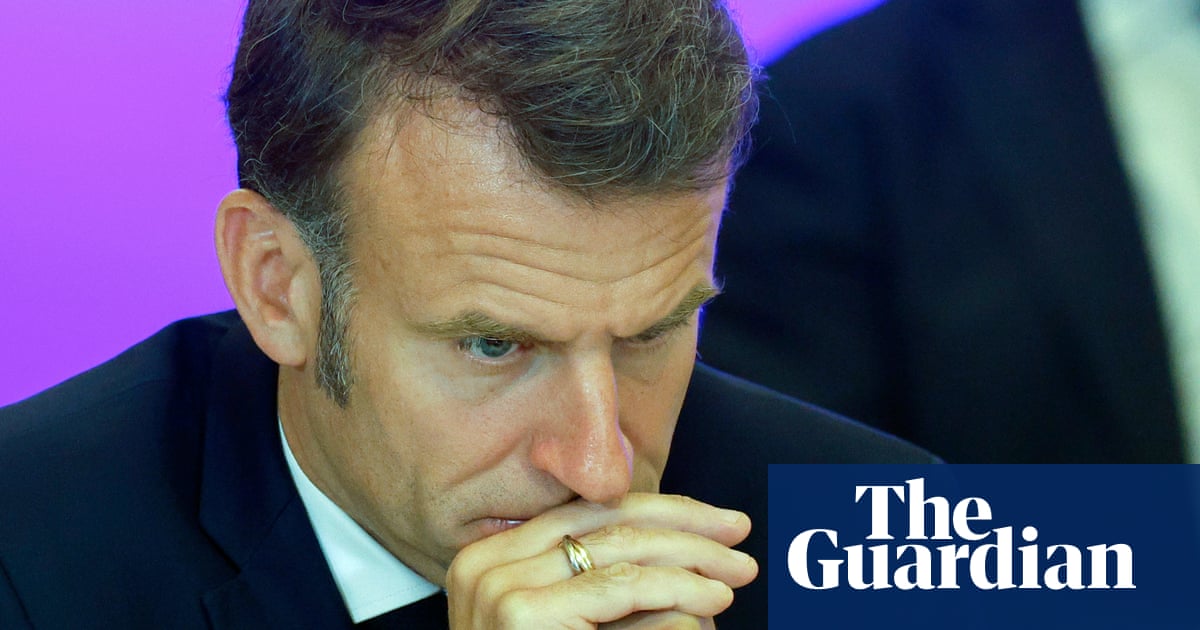British officials are dubious thatEmmanuel Macronintends to press ahead with French recognition of a Palestinian state next month – the first by a G7 nation – which could also push back the UK government following suit.
The French president indicated last month that Paris might recognise Palestine, joining 148 other countries, but said he wanted to do so at a UN conference in New York in June as part of a wider process.
The UN conference on the two-state solution is scheduled for 2-4 June, co-chaired byFranceand Saudi Arabia.
Israel has already warned Macron that recognition would be seen as rewarding Hamas, and France has been trying to forestall the criticism by strengthening a reformed Palestinian Authority to govern Gaza.
The UK foreign secretary, David Lammy,has confirmed to parliamenthe has been in discussions with the French about recognition, but also said he would not simply support a gesture with no practical impact. But the growing British view is that France – a country that has debated recognition for more than a decade – will decide the conditions are not ripe.
The UK has for years said it will recognise a Palestinian state, but only at the point of maximum impact, without defining that moment any further.
But British officials admit anger at the Israeli blockade of aid intoGaza, and backbench Labour MPs’ frustration with their party’s response in government is putting pressure on the Foreign Office to back an initiative.
The UK Middle East minister, Hamish Falconer, was forced in the Commons this week to defend claims by government lawyers in the high court thatthere is no genocide in Gaza, or that women and children were being targeted by Israel. Edward Leigh, father of the house and a Conservative, asked Falconer if he was “aware that many friends of Israel worldwide, notwithstanding narrow legal definitions, are asking this moral question: when is genocide not genocide?”
A Palestinian human rights group, Al-Haq, is seeking a judicial review that the government has acted unlawfully in continuing to supply components and spares for F-35 fighter jets to a global pool that can then be transferred to Israel in Gaza.
A Ministry of Defence official in a heavily redacted 11-page submission discussed in closed court on Friday, claimed the F35 jet fighter programme is largely owned by the US government and consensus is required for approval to be given to any UK request that its parts are not transferred to Israel.
Labour defends its Palestine policy by pointing to September’s suspension of arms exports to Israel for use in Gaza. But figures released on Thursday showedthe government approved $169m worth of military equipment to Israelin the three months that followed the Labour government’s partial suspension. The export data show that 20 different licences in categories such as military aircraft, radars, targeting equipment and explosive devices were approved between October and December 2024.
Arms campaigners say the three-month total is more than what was approved altogether under the Tory government between 2020 and 2023.
The business department said: “The majority of military licences by value approved in 2024 is made up of components for items being produced in Israel for third countries, including our Nato allies, and we continue to assess all licence applications on a case-by-case basis against our strict criteria.”
The controversy is relevant to Britain’s recognition of Palestine in that ministers are now under political pressure to point to practical steps being taken to show disapproval of the methods Israel is using to eliminate Hamas.
Sign up toThis is Europe
The most pressing stories and debates for Europeans – from identity to economics to the environment
after newsletter promotion
The June conference in New York is born out of a UN general assembly resolution passed in the wake ofthe international court of justice (ICJ) July 2024 advisory opinion declaring that the Israeli occupation was unlawfulunder international law. The General Assembly resolution passed in September 2024 set a 12-month “deadline” for action to be taken on the ICJ ruling.
France has a long history dating back to the former president François Hollande of suggesting that it is on the brink of recognising Palestine, but in the end has always pulled back, arguing the timing was not right, or there was a lack of international diplomatic consensus.
Macron in April said: “We must move towards recognition, and we will do so in the coming months […] I also want to participate in a collective dynamic, which must also allow all those who defend Palestine to recognise Israel in turn, which many of them do not do.”
Michel Duclos, senior fellow at the Institut Montaigne, said: “My impression is that there are as many opinions on recognition as there are advisers to the president. But if the president has to wait for Saudi Arabia to recognise Israel, it is clear from the Trump visit to the Gulf, he will have to wait for a long time.”
The formal aim of the UN conference is to “urgently chart an irreversible pathway towards the peaceful settlement of the question of Palestine and the implementation of the two-state solution”.
If Macron requires Saudi recognition of Israel as a quid pro quo for his recognition of Palestine, it is unlikely to happen in June without at minimum a permanent ceasefire. The Saudi foreign ministry this week again accused Israel of committing genocide in Gaza, and normalisation remains off its agenda.
WithinEurope, only Spain, Ireland, Sweden, Slovenia and Norway have recognised Palestine. The US last vetoed full recognition of Palestine at the UN in April 2024. The UK abstained and France backed the move.
A group of French politicians and academics in an article in Le Monde this week argued recognition was a “moral imperative, a political necessity, a strategic requirement” and the only way for France to escape “an untenable diplomatic paradox” in proclaiming its commitment to the two-state solution while refusing to recognise one of them.
